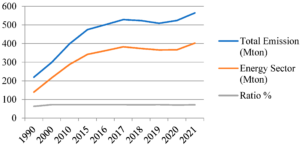Enhancing Turkey’s policy framework for energy efficiency of buildings, and recommendations for the way forward based on international experiences
The document titled “Enhancing Turkey’s Policy Framework for Energy Efficiency of Buildings” outlines strategies and recommendations to improve energy efficiency in Turkey’s building sector. It emphasizes the importance of adopting international best practices and integrating them into national policies to achieve significant reductions in energy consumption and greenhouse gas emissions.

Overview of Energy Efficiency in Turkey
Turkey’s building sector is a major contributor to energy consumption, accounting for approximately 36% of the total final energy use and around 32% of national greenhouse gas emissions. The document highlights that enhancing energy efficiency in buildings can potentially reduce emissions by up to 30%, which translates to a theoretical reduction of 38.4 million tonnes of CO2 equivalent annually. This reduction is crucial for Turkey’s commitment to its Intended Nationally Determined Contributions (INDCs) under the Paris Agreement.
Current Policies and Framework
The Turkish government has initiated several policies aimed at improving energy efficiency. Key measures include:
- Mandatory Energy Certification: As of January 2020, energy certification for buildings is mandatory under law N° 30051, which has led to over 1 million certifications issued, including for newly constructed buildings.
- Regulatory Framework: The document discusses the need for a robust regulatory framework that incorporates energy efficiency standards into building codes, ensuring compliance through effective enforcement mechanisms.
- Public Awareness Campaigns: Initiatives are being undertaken to raise awareness about the benefits of energy-efficient buildings among stakeholders, including architects, builders, and the general public.
Recommendations for Policy Enhancement
To further enhance Turkey’s policy framework, the document proposes several recommendations:
- Adoption of International Standards: Turkey should consider adopting international best practices in building energy performance standards, drawing lessons from successful models implemented in other countries.
- Financial Incentives: Introducing financial mechanisms such as subsidies or tax incentives can encourage investment in energy-efficient technologies and retrofitting existing buildings.
- Capacity Building: Training programs for professionals in the construction industry on energy-efficient design and technologies are essential. This includes developing educational curricula focused on sustainable building practices.
- Data Management Systems: Establishing comprehensive data management systems can help track energy consumption patterns and facilitate informed decision-making regarding energy policies.
- Pilot Projects: Implementing pilot projects that showcase energy-efficient retrofitting can serve as models for broader application across the country.
Integration with Other Sectors
The document emphasizes the interconnectedness of energy efficiency with other sectors such as urban planning, transportation, and environmental sustainability. A holistic approach that integrates these sectors can lead to more sustainable urban development and improved quality of life for citizens.
Challenges and Barriers
Despite the progress made, several challenges hinder the advancement of energy efficiency in Turkey:
- Lack of Awareness: There is still a significant gap in awareness among stakeholders about the benefits and importance of energy-efficient buildings.
- Financial Constraints: High upfront costs associated with implementing energy-efficient technologies can deter investment.
- Regulatory Gaps: Inconsistencies in enforcement and compliance with existing regulations can undermine efforts to improve energy efficiency.
Conclusion
The document concludes by stressing the urgency of enhancing Turkey’s policy framework for energy efficiency in buildings. By adopting international best practices, providing financial incentives, improving capacity building, and integrating efforts across sectors, Turkey can make significant strides toward reducing its energy consumption and greenhouse gas emissions. The successful implementation of these recommendations will not only contribute to environmental sustainability but also promote economic growth through increased efficiency in the building sector.In summary, Turkey stands at a critical juncture where strategic policy enhancements can lead to substantial improvements in energy efficiency within its building sector, aligning with global sustainability goals while addressing domestic energy challenges.

Energy efficiency in public buildings in Turkey | Internationale Klimaschutzinitiative (IKI)
“Promoting Energy Efficiency in Buildings in Turkey” Project Brochure undp
Promoting Low Cost Energy Efficient Wooden Buildings in Türkiye | United Nations Development Programme
